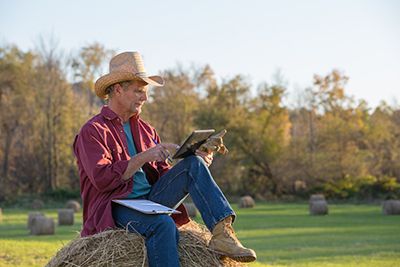The family farm is in trouble. It is difficult for the small farmer to compete with large agricultural businesses. Cities are expanding, encroaching upon farmland. Even in rural areas, companies increasingly desire to purchase large tracts of land to build distribution centers. On the home front, the interests of family members can diverge. Some children might want to continue to farm while others might leave the firm for other careers. The ones who leave the farm often want to sell their shares of it. The farm becomes smaller and smaller until farming is simply not tenable. But there is a way to preserve the family farm indefinitely, through the use of conservation easements.
What are conservation easements?
People generally think of land ownership as a single, all-encompassing right. But in fact, the ownership of land consists of a bundle of distinct rights. For example, landowners have the right to own their land, to use their land, to sell their land and to pass it on to their heirs. They also have rights to grant easements to their land. We normally think of easements as, for example, the right of the city to run a sewer line under part of our property to serve the rest of the neighborhood. But an easement can convey a variety of rights. A conservation easement grants the rights to control development and use of a property to a land trust that enforces those rights.
What kinds of rights may an easement grant?
According to the IRS, a conservation easement must have a conservation purpose. The IRS lists four conservation purposes. A conservation easement must fall within at least one of them. The purposes are:
- Preserving property for public recreation, such as a lake or river for boating or fishing, or a nature or hiking trail, or for educational purposes
- Protecting the natural habitats of fish, wildlife or plants or similar ecosystems
- Preserving open spaces, such as farmland or forest land, for the scenic enjoyment of the public
- Maintaining historically important land areas or certified historic structures
Although these purposes might seem limited, in practice they are broadly construed. For example, a landowner could reserve the right to build a house on the property and to continue to farm or ranch on the property. Most important for the family farm, a landowner can restrict development of the property or even forbid subdividing it or selling it piecemeal. The tradeoff is that for some of the conservation purposes, there must be public access. But a landowner need not subject the entire property to a conservation easement. The landowner may elect to except some of the land from the conservation easement.
Tax advantages from a conservation easement
There are two possible tax benefits from using a conservation easement. First, a landowner can deduct the value of the conservation easement from the landowner's federal income tax. Why is that? The conservation easement is granted to a land trust, which is a type of nonprofit organization, or to a local government. The second tax benefit is the possibility of avoiding or minimizing estate taxes when the landowner passes away. The land is worth less than its full market value because it is encumbered by an easement.

How long can a conservation easement last?
The short answer is indefinitely. Ordinarily the law does not like property to be tied up for long after the landowner dies. Hence, there a legal doctrine called the “rule against perpetuities” that imposes limits on how long an individual may restrict the use of that person's property after death. But artificial entities - like land trusts, which are essentially nonprofit corporations - don't die because they can't. For that reason, using a conservation easement to place restrictions on the use of a landowner's land can theoretically last forever.
What about using a revocable trust or a corporation?
In the past, I've written about the possibility of placing a family farm in a revocable family trust or incorporating the family farm. These tools can be valuable in keeping the family farm intact. But the revocable family trust is primarily a means to minimize estate taxes. As for corporations, shares can be bought and sold and the corporation possibly dissolved, leading to fragmentation of the family farm. One critical benefit of the conservation easement is that it is said to “run with the land.” In other words, the easement remains in place even if the land is sold or otherwise disposed of.
Examples of uses of conservation easements
My home state of Texas has an organization called the Texas Land Trust Council. The Council has put together a nice booklet describing land trusts in Texas, including case studies of some farms and ranches that have embraced conservation easements. Here are four of them:
- The Albert & Wilda Pecore Farm, consisting of 85 acres between Austin and Houston, where the Pecores run about 25 head of cattle. The Pecores granted a conservation easement for 17 acres of the ranch. This tract includes native Blackland Prairie pastures that abundantly produce chest-high grass for grazing the cattle.
- The Vacek Family Farm, also between Austin and Houston, a 250-acre historic farm. The owners have an extended family of 50 or more people. The best way to keep the farm intact was to use a conservation easement. The easement allows the family to continue to farm and preserves the farm for the entire family's enjoyment indefinitely.
- The Lantana Ridge Ranch, made up of 6,200 acres of south Texas ranch land, all subject to a conservation easement that meets the needs of the family but also allows the family to continue grazing and farming as well as engage in wildlife management. The family's primary goal in granting the conservation easement was to keep the ranch intact, in perpetuity.
- The Spread Oaks Ranch, at 5,500 acres, near the Texas coast. The family wanted to ensure that the ranch never could be subdivided and would remain in the same pristine condition it had been for generations. The family continues to ranch on the property. They also hunt and farm, both conventionally and organically.
Custom conservation easements
Conservation easements are created by a written agreement between the landowner and the land trust. The easements are typically tailored for the needs of each landowner. A great resource for further information is the nonprofit Land Trust Alliance. Also, the National Conservation Easement Database includes a listing of conservation easements across the United States. If a landowner wants to preserve the family farm from encroachment or being broken up, the conservation easement warrants serious consideration.



